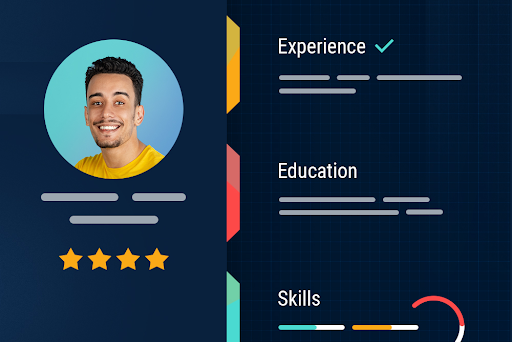Tips for a Professional CV

Boost your resume to the top of the HR stack
You’ve completed your training, finished your projects to build your portfolio, earned a certification or two, and you are ready to plaster the known universe (as defined by the internet) with your curriculum vitae, aka CV, aka resume. Your CV is your billboard and your list of credits. It’s your inestimable first impression reduced to a single piece of paper that has to compete with other single pieces of paper for hiring managers’ attention. You’ve got to nail this first step in your job search. No pressure!
Okay, so the pressure is actually pretty intense. Whether this is your first CV as an entry-level job seeker or you’re a seasoned professional looking for the next big adventure, you want your resume to stand out so it lands on the top of the stack instead of getting buried at the bottom of the heap. Below are five tips gleaned from an array of sources to help you craft the best possible CV to achieve your goal—get a job!
Tip 1 – Laser focused and personalized
Job hunters commonly begin with a generic resume—a vanilla draft that could work as well for a fast food restaurant as a brain surgeon. That’s an okay place to start, but you cannot stop there. Interviewers want to know what you bring to their table, not to just any old table.
Look at the job postings on popular job boards for the position you want to fill. In particular, look at the search keywords accompanying the postings. If you want to apply for a Network Engineering job, you may see words like “infrastructure,” “security,” “analyze,” and “troubleshoot.” Examine the job description for additional terms that identify the skills that are important for the job. Then, make sure those keywords and phrases appear in your CV. If managers are looking for someone who understands infrastructure and can troubleshoot outages, and they see those words in your resume, they are going to want to talk to you.
Tip 2 – Highlight accomplishments
Listing duties in previous jobs is a waste of space. Managers don’t care about the routine tasks you performed. What they want to know is what you accomplished. Even achievements unrelated to the technical details of the job you are seeking can be pertinent. For example, the fact that you flipped burgers is immaterial. On the other hand, winning the employee of the month award is evidence of your enthusiasm and work ethic that are applicable in any employment setting.
If you are pivoting to a new career, you may not have much direct work experience in your field. So, focus on your training accomplishments. Talk about the challenging projects in your portfolio. Again, try to highlight the things you have learned that relate to the keywords you found from Tip #1.
Tip 3 – Present a clean, readable format
An attractive, sharp format invites the manager to focus on your CV. A document that is cluttered and disorganized will trigger judgments in the reader that will send your resume to the bottom of the pile. Keep the format simple, and leave plenty of white space. A document crammed with endless blocks of text is off-putting.
Readability is the key. Use a basic font, like Arial or Times New Roman, in the 10-12 point range. You want your text to be easy on the eyes. Also, avoid wild colors, frilly borders, and extra large, extra bold headlines.
Include the most relevant and impressive information in the top third of your document. Make your strongest impression at the beginning. If you hook the readers at the outset, they are more likely to read all the way to the bottom. If your CV is lackluster in the beginning, the chances of the manager getting to the last line are not good.
Tip 4 – Use active voice
Use action words and strong verbs. Choose words like achieved, accomplished, completed, and earned. At the same time, avoid adverbs, like very, highly, and greatly. They don’t add substantive information. If you ranked “very highly” in your class, be specific:
“I finished in the top 10% of my class.”
Don’t shy away from power words, like exceptional, superior, and excellent. Be truthful, but say it in a compelling way.
Avoid using the passive voice. Employers want to know what you have done, not what has been done to you. For example, this is a passive sentence: “I was awarded the top honor.” An active, stronger sentence would be,
“I earned the top honor.”
Also avoid am, was, were, and other forms of be. For instance, turn “I am an A student” into
“I earned straight A’s.”
Be terse but not cryptic. Throw out extraneous words that create bulk in your sentences without adding meat. “While I studied Python programming, I completed three programming projects, which you can see in my portfolio.” Trim this fat sentence to the essentials:
“Completed three Python programs (see attached portfolio).”
But make sure you include enough information for the statement to make sense. “In the top 10” doesn’t provide enough context to be meaningful.
“Graduated in Top 10%”
is still just four words, but now the reader knows what you are talking about.
Tip 5 – Mistakes to avoid
If you have created the right resume with the right information in the right format to make it easy to read and compelling for a hiring manager, but you’re still not getting calls for interviews, you might have made one of these fatal mistakes. Check your CV for any of these:
- Typos
- Too long or too short
- Poor summary
- Incorrect contact information
Proofreading your CV is essential. Even better, get someone else to read it. Not your mom or your best friend, but someone with resume experience—ideally someone with experience in the industry or even the specific job you are aiming for. Get honest feedback and then act on it.
Final thoughts
Your brilliant technical expertise won’t mean anything if it doesn’t translate onto your CV. In the same way that you should dress professionally, be properly groomed, smile, and brush your teeth when you go for an interview, your resume should be polished and professional. You don’t want spinach stuck between your teeth when you greet the interviewer, and you don’t want your resume to be sloppy and underwhelming, or you’ll never get an interview.
A key component of RemoteMode’s full-service remote tech training program is assistance in creating your professional CV. A professional career counselor helps you craft your resume and polish it until it sparkles. This may be your first resume, but your counselor has worked with literally hundreds of job seekers. Your counselor knows what does and doesn’t work in a CV to catch a manager’s attention and get your phone to start ringing.
Along with CV guidance, the team at RemoteMode helps you build a strong professional social media network. Your network is essential to making connections with the people who are hiring. Your team rehearses with you for your first interview so you know what to expect and how to answer questions adroitly.
Coupled with RemoteMode’s professionally designed and produced training in more than a dozen career tracks, real world projects created by industry experts in Virtual Lab, and a personally assigned mentor to guide you through your program, RemoteMode prepares you in every way to pivot to a new career in IT. You are not only trained, but you are groomed and polished to be the ideal candidate in any hiring manager’s short-list of candidates.
Contact a RemoteMode career advisor today to learn how quickly you can go from learning to earning in the remote tech career of your choice. As about the fast-track “IT Professional” course to help you determine in just a few hours which career track is right for you.
Take the first step to your new remote career!






